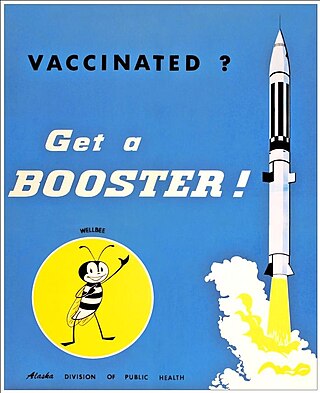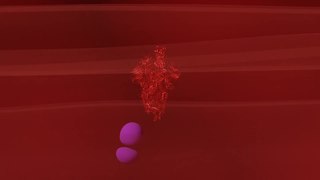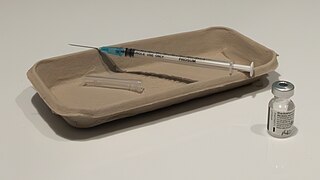Related Research Articles

Peter Charles Doherty is an Australian immunologist and Nobel laureate. He received the Albert Lasker Award for Basic Medical Research in 1995, the Nobel Prize in Physiology or Medicine jointly with Rolf M. Zinkernagel in 1996 and was named Australian of the Year in 1997. In the Australia Day Honours of 1997, he was named a Companion of the Order of Australia for his work with Zinkernagel. He is also a National Trust Australian Living Treasure. In 2009 as part of the Q150 celebrations, Doherty's immune system research was announced as one of the Q150 Icons of Queensland for its role as an iconic "innovation and invention".
The Medicines and Healthcare products Regulatory Agency (MHRA) is an executive agency of the Department of Health and Social Care in the United Kingdom which is responsible for ensuring that medicines and medical devices work and are acceptably safe.

A booster dose is an extra administration of a vaccine after an earlier (primer) dose. After initial immunization, a booster provides a re-exposure to the immunizing antigen. It is intended to increase immunity against that antigen back to protective levels after memory against that antigen has declined through time. For example, tetanus shot boosters are often recommended every 10 years, by which point memory cells specific against tetanus lose their function or undergo apoptosis.
The Joint Committee on Vaccination and Immunisation (JCVI) is an independent expert advisory committee that advises United Kingdom health departments on immunisation, making recommendations concerning vaccination schedules and vaccine safety. It has a statutory role in England and Wales, and health departments in Scotland and Northern Ireland may choose to accept its advice.

The National Security Committee (NSC), also known as the National Security Committee of Cabinet, is the peak decision-making body for national security and major foreign policy matters in the Australian Government. It is a committee of the Cabinet of Australia, though decisions of the NSC do not require the endorsement of the Cabinet itself.
The COVID-19 pandemic in Australia was a part of the worldwide pandemic of the coronavirus disease 2019 caused by severe acute respiratory syndrome coronavirus 2. The first confirmed case in Australia was identified on 25 January 2020, in Victoria, when a man who had returned from Wuhan, Hubei Province, China, tested positive for the virus. As of 6 August 2022, Australia has reported over 11,350,000 cases, over 11,330,000 recoveries, and 19,265 deaths. Victoria's second wave having the highest fatality rate per case.

A COVID‑19 vaccine is a vaccine intended to provide acquired immunity against severe acute respiratory syndrome coronavirus 2 (SARS-CoV-2), the virus that causes coronavirus disease 2019 (COVID‑19).

The National Cabinet is the primary Australian intergovernmental decision-making forum composed of the prime minister and state and territory premiers and chief ministers of Australia’s six states and two mainland territories.

In response to the COVID-19 pandemic in the United Kingdom, the UK Government introduced various public health and economic measures to mitigate its impact. Devolution meant that the four nations' administrative responses to the pandemic differed; the Scottish Government, the Welsh Government, and the Northern Ireland Executive produced different policies to those that apply in England. Numerous laws were enacted or introduced throughout the crisis.

Laura K. Mackay is an internationally-recognised immunologist and Professor of Immunology at the University of Melbourne. Mackay is the Theme Leader in Immunology and Laboratory Head at the Peter Doherty Institute for Infection and Immunity. In 2022, she was the youngest ever Fellow elected to the Australian Academy of Health and Medical Sciences.

The COVID-19 vaccination programme in the United Kingdom is an ongoing mass immunisation campaign for coronavirus disease 2019 (COVID-19) during the COVID-19 pandemic in the United Kingdom.

The general COVID-19 vaccination in Australia program began on 22 February 2021 in response to the COVID-19 pandemic, with the goal of vaccinating all willing people in Australia before 2022. Front-line workers and aged care staff and residents had priority for being inoculated, before a gradual phased release to less-vulnerable and lower-risk population groups throughout 2021. The Therapeutic Goods Administration (TGA) approved four vaccines for Australian use in 2021: the Pfizer–BioNTech vaccine on 25 January, the Oxford–AstraZeneca vaccine on 16 February, Janssen vaccine on 25 June and the Moderna vaccine on 9 August. Although approved for use, the Janssen vaccine was not included in the Australian vaccination program as of June 2021.
The COVID-19 pandemic in Victoria was part of the worldwide pandemic of the coronavirus disease 2019 caused by severe acute respiratory syndrome coronavirus 2. The first confirmed case in the state of Victoria, also the first in Australia, was identified as being on 19 January 2020, when a man from Wuhan arrived by air from Guandong, China. His test results on 25 January confirmed he had COVID-19.
The COVID-19 pandemic in Queensland, Australia is part of the ongoing worldwide pandemic of the coronavirus disease 2019 caused by severe acute respiratory syndrome coronavirus 2.
The COVID-19 pandemic in the Australian Capital Territory is part of the ongoing worldwide pandemic of the coronavirus disease 2019 caused by severe acute respiratory syndrome coronavirus 2. After one case of the delta variant in mid-August 2021, the Territory went into lockdown. By 26 September, the ACT had its first COVID-19 related death since mid-April 2020, nearly 18 months, followed by 3 more deaths in the first week of October 2021. 28 deaths during the outbreak since 12 August 2021 brought total deaths to 31, the most recent being on 8 February 2022.
This article documents the chronology and epidemiology of SARS-CoV-2, the virus which causes the coronavirus disease 2019 (COVID-19) and is responsible for the COVID-19 pandemic in Australia during 2020.
This article documents the chronology and epidemiology of SARS-CoV-2, the virus which causes the coronavirus disease 2019 (COVID-19) and is responsible for the COVID-19 pandemic in Australia during the first half of 2021.
This article documents the chronology and epidemiology of SARS-CoV-2, the virus which causes the coronavirus disease 2019 (COVID-19) and is responsible for the COVID-19 pandemic in Australia during the second half of 2021.

The following is a timeline of the COVID-19 pandemic in the United Kingdom from July 2022 to December 2022.
The following is a timeline of the COVID-19 pandemic in the United Kingdom in 2023.
References
- 1 2 "The Peter Doherty Institute for Infection and Immunity" (PDF). Archived (PDF) from the original on 6 July 2017. Retrieved 21 August 2021.
- ↑ "The Peter Doherty Institute for Infection and Immunity - About | Doherty Website". www.doherty.edu.au.
- ↑ "Doherty Institute Modelling Report for National Cabinet". 3 August 2021.
- ↑ "Doherty Institute Modelling Report to advise on the National Plan to transition Australia's National COVID Response". Australian Government Department of Health. 3 August 2021.
- ↑ "Doherty modelling report for National Cabinet 30 July 2021". Peter Doherty Institute for Infection and Immunity. 3 August 2021 – via apo.org.au.
- ↑ "Economic Impact Analysis: National Plan to Transition to Australia's National COVID 19 Response | Treasury.gov.au". treasury.gov.au.
- ↑ "Boosters every six months not a viable strategy, says Doherty chief". Australian Financial Review. 6 February 2022. Retrieved 19 April 2022.